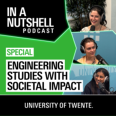Empower communities worldwide with innovative, sustainable solutions by combining engineering expertise with sociocultural knowledge.
Promoting well-being in underserved communities and reducing inequalities is not just an act of charity. If you really want to create sustainable, impactful solutions that empower communities to achieve better health, stability, and self-sufficiency, you need to take on a scientific approach – an approach that requires knowledge of engineering as well as sociocultural dynamics. Do you feel called upon to tackle complex humanitarian challenges all over the world, and develop socio-technological solutions by working together with people on location? For example, by contributing to disaster-resilient housing, developing solutions for safe water access or providing refugee camps with sustainable power solutions? Then the Master’s in Humanitarian Engineering at the University of Twente might just be what you are looking for.
In this Master's, you will develop an eye for the needs of underserved and marginalised communities in order to find and adapt technical solutions to suit their needs. Because without awareness of the local context, stakeholders and resources, engineering solutions may fall short of being effective or sustainable. So next to building technological knowhow, you will learn to integrate cultural, social, and economic factors into your design process, ensuring that the technologies are both practical and impactful.
Combine two master’s in three years
Want to get more out of your Master’s in Humanitarian Engineering? You can combine it with another master’s at UT – like Industrial Design Engineering, Spatial Systems & Society, Sustainable Energy Technology, or Civil Engineering & Management. In a tailor-made programme, you get to obtain two master’s degrees within only three years, instead of four!
Read more about combining two master's
Is Humanitarian Engineering the right degree for you?
The Master’s in Humanitarian Engineering is an interdisciplinary master’s programme, which means that students from many different backgrounds can join.
You might for example have a background in Civil Engineering and work on meaningful projects on disaster-resilient housing or infrastructures. Or you might have completed a Bachelor’s in the field of Biomedical Engineering and want to contribute to health-related projects in low-income countries, like building medical devices suited for low-resource settings. Or perhaps you are an electrical engineer and you are devoted to improving the connectivity or energy resources for off-grid communities. If you have a background in social sciences, you could – depending on your background – also be admitted into the Master’s in Humanitarian Engineering, as knowledge in social sciences is highly relevant in developing appropriate solutions addressing the underserved. You might then, for example, focus on engineering projects combined with sustainable and responsible entrepreneurship.
In some cases, you can only be admitted into this Master’s through a Pre-Master’s, or additional requirements might be requested.
Career perspectives
The demand for engineers with a commitment to social impact is growing as pressing global challenges such as climate change, natural disasters, poverty, hunger, conflicts and population displacement increase. So, with a Master’s degree in Humanitarian Engineering you have excellent prospects for a meaningful career in various fields, both nationally and internationally.
Jobs in Humanitarian Engineering
There is need for humanitarian engineers both in the public and private sector, as well as non-governmental organisations (NGOs) and international bodies. Of course, you can also continue with a PhD after your master’s and pursue a career as a researcher, at UT or any other university worldwide, or at a research institution. Or what about starting up your own social business and launch an innovative solution to address humanitarian challenges? The choice is up to you!
Related programmes
Below you find a list of educational programmes which are (closely) related to Humanitarian Engineering.
Engineering & Technology
Applied Mathematics
Expand your understanding of mathematics to tackle challenging issues in a variety of sectors. This Master’s teaches you to discover new patterns and predict them through mathematical models.
Applied Physics
Deepen your understanding of the laws of physics to find technical solutions in a wide range of areas such as IT, sustainability, healthcare, chiptechnology, digitalisation, finance, space and more.
Biomedical Engineering
Technological advances are at the heart of innovation in healthcare. In this Master's, you'll learn to develop medical innovations that contribute to better care, from organ-on-a-chip to exoskeleton.
Business Information Technology
Become an expert in IT-based business innovation, able to devise new services and radically improve the way businesses work.
Chemical Science & Engineering
Develop new chemical processes, materials and molecules and contribute to innovations that benefit our society in areas such as health, water, food and sustainability.
Civil Engineering & Management
Do you want to work on future-proof solutions in the construction, water and/or transport sector? Learn to manage civil engineering projects with an eye for both technical and non-technical aspects.
Computer Science
Become an expert computer scientist and learn to solve the biggest challenges of our digital society by designing and developing more secure and efficient ICT systems.
Construction Management & Engineering
Become an expert in managing large-scale, complex construction projects in an increasingly digitised industry, using an innovative, integral approach.
Electrical Engineering
Design smart and sustainable electronics and advanced chips for applications such as biomedical technology, autonomous vehicles, computer vision, nanotechnology and the energy transition.
Embedded Systems
Become an expert in designing the software and hardware of complex embedded systems in vehicles, pacemakers and chipsets, amongst others.
Industrial Design Engineering
Do you want to design innovative products that improve daily life and address today’s challenges? In this Master’s, you combine design and engineering to enhance both products and product development.
Industrial Engineering & Management
Combine technical expertise with management skills to analyse, improve, and future-proof complex business processes in (international) organisations.
Interaction Technology
Delve into the field of human-computer interaction and design and develop intelligent and interactive technologies that are meaningful to people and society.
Mechanical Engineering
Become an expert mechanical engineer who focuses on the futureproof design, analysis and maintenance of machinery, structures, products and production processes.
Nanotechnology
Tackle big challenges on the tiniest scale: become an expert in nanotechnology and develop smart, innovative solutions for major societal issues in healthcare, ICT and sustainability.
Philosophy of Science, Technology & Society
How does technology shape our lives and the world we live in? Learn to understand the role of modern technology in our society from a philosophical perspective.
Robotics
Become an expert in robotics: design smart, human-centred robots and combine AI, mechatronics, systems integration and ethics to make a real impact in industry and society.
Spatial Systems & Society
Natural disasters, poverty, food shortages, epidemics, and climate change: learn to tackle society’s complex challenges through urban design, urban planning, socio-economics insight and spatial data.
Sustainable Energy Technology
Work towards the energy transition! In this Master's, you will learn to conceive, develop and apply sustainable energy solutions for a future without fossil fuels.
Technical Medicine
This Dutch-taught Master's equips you to use AI, medical imaging and smart sensors to improve diagnoses, personalise treatments and safely apply technology in clinical practice.


